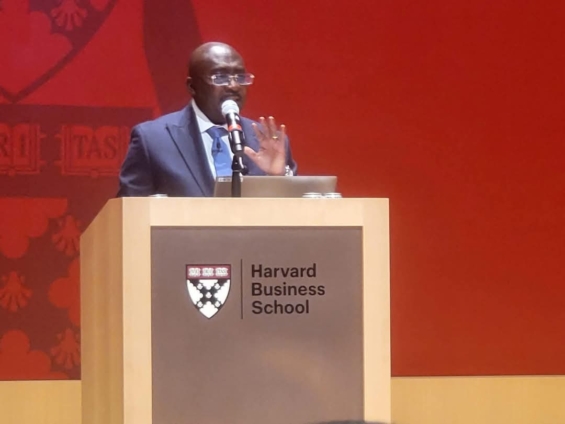Bawumia at Harvard: ‘Africa Can Leapfrog into the Future with Digitalisation’
Former Vice President Dr. Mahamudu Bawumia delivers a compelling lecture at Harvard University

- Bawumia showcases how Ghana has leveraged technology to modernize governance
- Digitalisation is driving financial inclusion
- He urges African leaders to embrace innovation
Former Vice President Dr. Mahamudu Bawumia captivated students at Harvard University with an insightful lecture on Ghana’s digital transformation and its role in driving economic growth.
Delivering the keynote address on the theme “Africa Beyond Borders: A Myth or a Mandate for Africa’s Progress,” Dr. Bawumia detailed Ghana’s groundbreaking digitalisation initiatives, emphasizing their impact on governance, business, and social services.
Reflecting on Africa’s historical exclusion from the first three industrial revolutions, he stressed the urgency of leveraging the Fourth Industrial Revolution to accelerate economic transformation.
“Policymakers in Africa must adopt a mindset of possibilities. We should embrace technology and not be intimidated by it. If we commit to innovation, we can leapfrog advanced nations in many sectors,” Dr. Bawumia asserted.
Ghana’s Digital Success Story
Dr. Bawumia outlined Ghana’s aggressive digitalisation drive over the past eight years, aimed at modernising public services and boosting economic efficiency.
“Our focus has been on technology that solves real-life challenges—not driverless cars or humanoid robots, but innovations that improve agriculture, healthcare, education, financial inclusion, and public service delivery,” he explained.
Previously, he noted, digitalisation was not central to Ghana’s national agenda, and his advocacy faced political skepticism. However, the results have been transformative:
National Identification & Addressing: The issuance of Ghana Cards to 85% of the adult population and the implementation of a digital address system have streamlined access to essential services.
Financial Inclusion: Mobile money interoperability has made Ghana one of the most financially inclusive nations.
E-Governance: Services such as passport applications, driver’s licences, and business registrations have been digitized for efficiency.
Healthcare Innovation: Government hospitals now use digital records, and remote areas benefit from drone-delivered medical supplies.
Digitalisation as a Catalyst for Job Creation
Beyond efficiency, Dr. Bawumia highlighted how digital transformation is creating jobs and expanding business opportunities.
“The digital payments infrastructure and property addressing system have fueled Ghana’s e-commerce boom. Many entrepreneurs now run online businesses through social media, with deliveries facilitated by digital addresses and mobile money transactions,” he noted.
A Call to Action for African Leaders
Dr. Bawumia concluded with a powerful message to African policymakers:
“The digital economy holds the key to Africa’s progress. Governments, businesses, and innovators must work together to create a future where every African has access to opportunities in the digital space.”
His address left a lasting impression on the Harvard audience, reinforcing Ghana’s position as a leader in Africa’s digital transformation.





